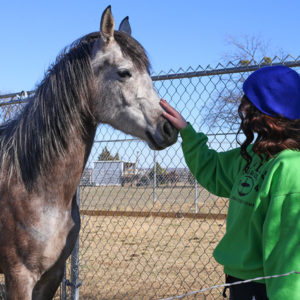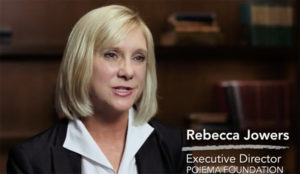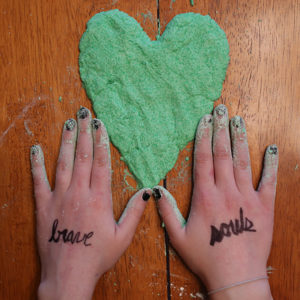ROCKWALL—Rebecca Jowers wants young women who have been victimized by human sex traffickers to view themselves the way God sees them—as his precious creation.
“They don’t need somebody to judge them. They have enough shame of their own,” said Jowers, founding executive director of Poiema Foundation, a human trafficking prevention and resource center.
The center takes its name from a Greek word for “handiwork” or “masterpiece,” as in the New Testament verse Ephesians 2:10—“We are God’s handiwork.” Poiema seeks to rescue and restore trafficked women, helping them rediscover their sense of self-worth and find their God-given purpose.
When she was a graduate student at Dallas Theological Seminary, Jowers learned human trafficking is the second-largest criminal enterprise in the world, behind drug dealing, and it generates about $150 billion annually.
She also found out most victims of sex trafficking are young girls who often are recruited at age 12 or 13.
“My passion is at-risk youth. I love teenagers,” said Jowers, a former math and science teacher.
‘American kids recruited by sex traffickers’
Once she began to research the topic, she discovered trafficking is not limited to developing nations, and Texas ranks second nationally in reported cases of human trafficking—mostly sex trafficking. As the mother of four daughters, the realization that young girls in Texas are victimized by sex traffickers broke her heart.

“I have a strong sense of justice, and once I found out we have a problem in the United States with slavery—because that’s what trafficking is—I wanted to shine a light on it,” she said. “American kids are being recruited by sex traffickers.”
After a mission trip to China in 2012, Jowers told a minister at Lake Pointe Church in Rockwall about her desire to launch an anti-trafficking ministry. He invited her to join the church’s child advocacy team.
“As it turned out, he and I were the team,” she recalled.
In the months that followed, she recruited others at Lake Pointe to work alongside her as they learned about ministries devoted to anti-trafficking. In 2013, she launched Poiema Foundation as a nonprofit organization.
Jowers developed Human Trafficking 101—an introductory presentation to raise awareness about the issue and educate church workers, teachers and community groups how to recognize victims of trafficking and report suspicious activity.
“I was praying about the next step. I wasn’t satisfied just talking about the problem,” she said.
Providing a safe house
Jowers dreamed of a safe house where women who have been rescued from sexual exploitation could receive trauma-informed care in a Christ-centered environment of unconditional love as they recover and prepare for a new way of life. She and her board began planning fund-raising events for a safe house, but she acknowledged her lack of expertise in that area.
“The Holy Spirit is our fund-raiser. I certainly don’t know how,” she confessed. “I am an educator. I know how to teach. I don’t know how to raise money.”

Even so, Poiema began to receive donations for the proposed safe house in April 2015. Two months later, Jowers’ prayers were answered when a woman who heard her speak to a Bible study group offered to donate a furnished home in the Dallas area to Poiema.
Jowers and her board continued to raise money to maintain and operate the safe house. A member of Lake Pointe Church provided insurance.
Poiema welcomed its first resident in February 2017, and more than 20 young women have benefited from its services since then.
More than a dozen churches across denominational lines partner with Poiema. A gynecologist and a dentist have provided professional services. Another individual offers to remove the tattoos of young women who were branded by their traffickers.
The Texas Baptist Hunger Offering has supplied funds to keep the kitchen stocked with groceries at Poiema’s safe house.
“The body of Christ has been amazing in providing what we need,” Jowers said.
Hear Their Cry
Dallas Baptist Association works with Poiema through its Hear Their Cry initiative—an effort to raise awareness about human trafficking and to involve churches and individuals in volunteer service opportunities on behalf of trafficking victims.

A grant made possible by the Mary Hill Davis Offering for Texas Missions enabled DBA to produce an educational video about trafficking that features Poiema and similar Dallas-area ministries.
Too many people view prostitution as a “victimless crime” involving women who choose that lifestyle, not recognizing about 80 percent are either victims of trafficking or being controlled and exploited by a pimp, said Jana Jackson, church strengthening director at Dallas Baptist Association.
“Popular entertainment like Pretty Woman presents this romanticized vision—the prostitute with a heart of gold who turns her life around when she meets the right guy,” Jackson said. “It blinds us to the reality of what is going on around us.”
Through Hear Their Cry, the association seeks to involve congregations in prevention, rescue and restoration ministries. Among other possibilities, churches may begin by holding a Human Trafficking 101 educational event, collecting toiletries and cleaning supplies for Poiema’s safe house or becoming prayer partners or pen pals for young women who have been trafficked.
Some members may move on to more advanced ministries such as Poeima-sponsored outreach events in eight North Texas communities or mentoring young women who are transitioning into a new life.
In the outreach events volunteers go to hotels, truck stops and convenience stores to distribute posters of missing children.
Volunteers who serve as mentors teach cooking, budgeting, help girls with academic lessons and lead Bible studies—“anything a mom would do in raising a child,” she explained.
‘The body of Christ loving these girls’
Jowers hopes to create awareness in congregations so girls who work through the process of recovery and restoration eventually find in those churches “a safe community that is going to love them.”

“The body of Christ loving these girls—that’s the solution,” she said.
Poiema works closely with 4theONE—a nonprofit organization focused on rescuing missing and exploited teens—to collect and enter data gained through observation during outreach events in communities, as well as by monitoring social media and searching the Internet. The organization forwards pertinent information to law enforcement to help find missing and exploited teens and to aid in prosecution of traffickers.
Poiema partners with Poetic, a nonprofit aftercare program that uses creative arts, trauma therapy and individualized instruction to help girls who have been trafficked earn a high school diploma.
Jowers also collaborates with Traffick911 in a variety of prevention, identification and empowerment ministries.
In time, she hopes to open a safe house near downtown Dallas, in a centrally located area accessible to young women who have been living on the streets. At that point, Poiema will convert its current safe house into transitional housing for young women as they prepare to live independently.
‘Keep focused on what God is doing’

Working with traumatized young women presents many challenges, Jowers acknowledged. Some bear physical scars, either inflicted by abusers or as signs of failed suicide attempts. All carry emotional, psychological and spiritual scars.
Often, a particular sight or sound can trigger a reaction—whether lashing out or withdrawing and disassociating from others.
“For one girl, it was the smell of peanut butter,” which reminded her of a man who exploited and abused her, Jowers said.
“It can be wearisome doing this kind of ministry,” she said. “It’s spiritual warfare. We’re going where Satan is at work, and where young women believe his lies are real. He doesn’t want the light to shine on what he is doing. We just have to keep focused on what God is doing.
“We have a survivor (of trafficking) on our staff. She is still going through the healing process, but she already is giving back. It’s sweet to see what God is doing in the lives of the girls.”















We seek to connect God’s story and God’s people around the world. To learn more about God’s story, click here.
Send comments and feedback to Eric Black, our editor. For comments to be published, please specify “letter to the editor.” Maximum length for publication is 300 words.